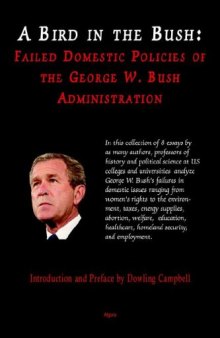 جزییات کتاب
جزییات کتاب
In this collection of essays the authors, professors of history and political science at US colleges and universities, analyze George W. Bush's record on domestic issues ranging from women's rights to the environment, power, transportation, taxes, abortion, education, welfare, healthcare, homeland security, and employment. The need for such an examination was sparked by what many informed and responsible Americans have seen as serious blunders committed by President George W. Bush, even during his first term of office. Especially troublesome was the 2005 Inaugural Address. That address illustrates how Bush II is derailing the purpose of America as a nation. Bush II could not perform this derailing all on his own. He had help. Both the introduction and the lead article present a framework of Republican activities covering a wide range of conservative thinking reaching back to the Nixon era. The remaining articles show how various additional individual policies have failed. It is this conservative thinking that has undermined the roadbed and allowed for Bush II s distortion of the nation s avowed stand for freedom and democracy. The perspective of Republican activities also helps show why various Bush II policies that many see as blunders have been able to go unchallenged. Hopefully, this book will succeed in informing voters where other media have failed. Other books have attempted to describe these informational limitations. Neil Postman s Language in America rings as relevant today as it did when it pointed out the problem of media intensity four decades ago. Three decades ago, Alvin Toffler described the problem of time crunching in Future Shock. James Gleick has reiterated both media intensity and time crunch dilemmas in his book, FSTR: Faster, the Acceleration of Just about Everything. Books themselves, with their more deliberate and hopefully more cognitive and in-depth research capabilities, are no panacea, either. Special interests, personal prejudices, religious leanings, and outright dishonesty can slant books just as easily as they do other media programs and presentations. Also, books are just as susceptible to logical fallacies and propaganda devices as other media forms are. The writers represented in A Bird in the Bush: Failed Domestic Policies of the George W. Bush Administration have attempted accuracy and honesty, above all else. I am most grateful to all the scholars who have contributed so generously of their time, talent, and yeoman effort, to say nothing of their love for and dedication to their country, in preparing these articles. They join me in one of the most patriotic efforts imaginable responsible, constructive, and caring criticism of our government. When Vice President Dick Cheney and Attorney General John Ashcroft intimate that critics of the Bush II administration are committing treason (the same argument was made during the Nixon and Reagan presidencies), they need to recall a statement from The Arrogance of Power, written by one of America s and the world s most distinguished thinkers, the late Sen. J. William Fulbright. Fulbright not only approved such dissent but called it a duty. Unfortunately, this duty promotes anger from the targets of that criticism, which can result threats from them and create fear among the public. The discharge of the duty of dissent is handicapped in America by an unworthy tendency to fear serious criticism of our government. This threat and fear process was once again illustrated by Bush when he contended that those politicians who opposed his social security legislation would be sorry.



 دانلود کتاب
دانلود کتاب

 جزییات کتاب
جزییات کتاب





 این کتاب رو مطالعه کردید؟ نظر شما چیست؟
این کتاب رو مطالعه کردید؟ نظر شما چیست؟
